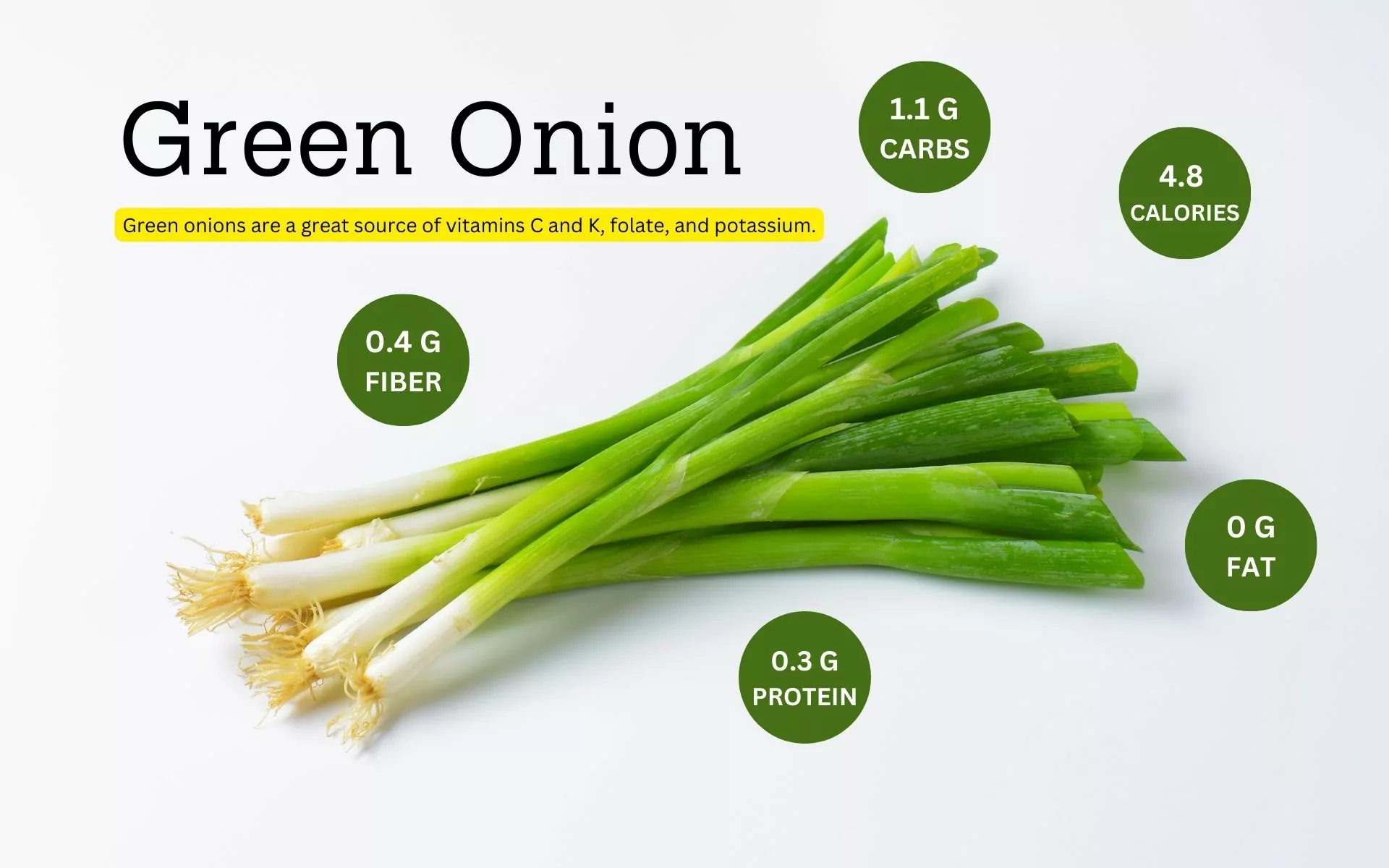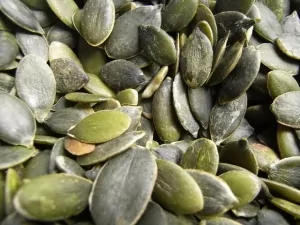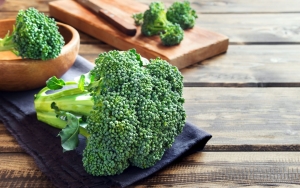Go for Green Onions to Get These 9 Health Benefits
Green onions, also known as scallions, are famous in many cuisines worldwide. These young onions are harvested before the bulb has fully developed. They are typically long and slender, with a white base that transitions to a green stalk. This vegetable has a mild onion flavor that is less pungent than mature ones, making them a popular ingredient in dishes requiring a milder onion taste. Unlike ordinary onions, green onions are typically consumed raw or lightly cooked. They are often used as a garnish for dishes, while mature onions are typically cooked until soft and are used as a base for sauces, soups, and stews.
In addition to being a tasty addition to many dishes, spring onions offer various health benefits. From boosting the immune system to promoting healthy digestion, incorporating this food into your diet can provide numerous advantages for your overall well-being. This article will explore the benefits of eating green onions and why you should consider incorporating them into your diet.
Green Onion Nutrition Facts
The USDA provides the nutritional value of green onions for 1 medium (15g) when consumed raw.
- Calories: 4.8
- Fat: 0g
- Sodium: 2.4mg
- Carbohydrates: 1.1g
- Fiber: 0.4g
- Sugar: 0.4g
- Protein: 0.3g
In addition to these green onion nutrition facts, spring onions are rich in vitamins and minerals such as C, K, folate, and potassium.
9 Health Benefits of Green Onions
Green onions contain nutrients and health benefits, making them valuable to any diet. So, here are nine health benefits of green onions.
1. Good For Heart
Studies have demonstrated that green onions’ flavonoids and carotenoid antioxidants can reduce the likelihood of developing heart disease. Furthermore, green onions possess sulfur-containing compounds like allicin and allyl sulfide that have been shown to aid in lowering cholesterol levels and preventing blood clots. In addition, the anti-inflammatory properties of these compounds can aid in reducing the risk of heart disease.
Moreover, green onions are a noteworthy source of folate, an important B vitamin supporting heart health. Lowering homocysteine levels is one-way folate, a B vitamin found in green onions, can benefit heart health.
2. Strengthens Bones
Another one of the greatest benefits is strengthening bones. Green onions are a good source of vitamin K, a crucial nutrient vital to bone health. Vitamin K helps increase bone density, which is essential for preventing osteoporosis and fractures. It also works with calcium to promote the growth and maintenance of bones.
This onion is also rich in other nutrients, such as calcium and phosphorus, necessary for maintaining strong bones. So adding green onions to your diet can help keep your bones healthy and strong.
3. Improves Skin Condition
This is one of the impressive and true facts and health benefits of spring onions. Green onions are an excellent source of vitamins A and C essential for healthy skin. Vitamin A helps to promote skin cell turnover, while vitamin C aids in the production of collagen, which is necessary for maintaining skin elasticity. In addition, the sulfur compounds found in this vegetable also contribute to healthy skin by promoting the production of keratin, a protein that helps to strengthen hair and nails.
Furthermore, antioxidants such as flavonoids and carotenoids in green onions can aid in reducing the risk of skin damage and premature aging by shielding the skin from free radicals. Therefore, incorporating spring onions into your diet can help improve your skin’s overall condition and appearance.
4. Boosts Immunity
Being rich in powerful antioxidants and immune-boosting nutrients, this healthy product offers another of the most valuable benefits to the body. It can help protect from various infections and diseases. Green onions contain a significant amount of vitamin C, essential for strengthening the immune system by increasing the production of white blood cells that protect the body from infections.
Additionally, phytochemicals, such as quercetin and allicin, contained in spring onions possess potent antibacterial and antiviral properties. Therefore, regularly consuming this food can help keep your immune system strong and improve your overall health.
Read also – Here Is How to Get B Vitamins in Your Vegan Diet
5. Supports Eye Sight
Green onions are packed with essential nutrients that support good vision. They are a great source of vitamin A, which plays a vital role in maintaining healthy vision. The maintenance of healthy eyesight is supported by Vitamin A, which green onions are rich in. Vitamin A plays an important role in keeping the eyes’ surface moist and supports the functioning of the retina, the part of the eye responsible for vision in low-light conditions.
Furthermore, green onions are a notable source of vitamin C, a potent antioxidant that safeguards the eyes against age-related degeneration. Vitamin C is also essential for producing collagen, a protein crucial for the eyes’ structure.
Furthermore, green onions contain small amounts of minerals like zinc and copper that are important for maintaining good vision. Zinc helps to transport vitamin A to the retina, while copper is necessary for the production of melanin, a pigment that protects the eyes from ultraviolet radiation.
6. Prevents Cancer
These nutrition rich bulbs contain flavonoids, sulfur compounds, and other antioxidants that can help prevent cancer. In addition, these compounds have been shown to have anti-inflammatory properties and may help stop the growth of cancer cells.
Quercetin, a flavonoid found in green onions, has been shown to have anticancer effects, particularly against breast and colon cancers. In addition, the sulfur compounds in this vegetable can help the liver detoxify cancer-causing substances. Therefore, regular consumption of green onions as part of a healthy diet may help reduce cancer risk.
7. Controls Blood Sugar Levels
Incorporating this food into your diet benefits those with diabetes. They are a rich source of fiber, which helps slow down sugar absorption into the bloodstream, preventing spikes in blood sugar levels.
Furthermore, green onions are a low-calorie food source that contains quercetin, a compound known for its anti-inflammatory and anti-diabetic properties. Incorporating green onions into a healthy diet can help regulate blood sugar levels, promote overall well-being, and decrease the likelihood of developing health complications related to diabetes.
8. Improves Digestion
One of the most valuable benefits of green onions is improving digestion, which is particularly important when considering their weight. Green onions are an excellent source of dietary fiber, which plays a crucial role in digestive health. The fiber content in green onions helps regulate bowel movements, prevent constipation, and maintain a healthy digestive system.
Furthermore, the significant amount of prebiotics in green onions can promote the growth of good bacteria in the digestive tract, leading to better nutrient absorption and a stronger immune system. By promoting a healthy digestive system, green onions may lower the risk of colon cancer and other gastrointestinal disorders. This makes them an excellent addition to a balanced diet for those watching their weight.
Read also – 7 Yummiest Veggies for Grilling This Spring
9. Prevention of Infections
Green onions are a rich compound source with antimicrobial and antiviral properties. The high concentration of sulfur-containing compounds such as allicin and quercetin is effective against many bacteria and viruses. These compounds work by disrupting the cellular membrane of the pathogen and inhibiting its growth and replication.
Regularly consuming green onions can help prevent bacterial and viral infections such as colds, flu, and urinary tract infections. These onions also have anti-inflammatory properties that can help to reduce the severity of infections and prevent them from spreading.
Increasing the serving size of green onions is recommended if you wish to obtain their full nutritional benefits, as using them merely as a garnish would not provide sufficient nutrients.
What Are the Side Effects of Onions?
While they offer many nutritional benefits, there are some individuals for whom eating green onions may not be advisable. Here are some groups of people who should exercise caution when consuming green onions:
- People with kidney problems: Green onions contain oxalates, which can build up in the body and cause kidney stones in susceptible individuals. People with kidney problems or a history of kidney stones should limit their intake of this product.
- Individuals taking blood-thinning medications: Spring onions have blood-thinning properties, which benefit some people. However, those taking blood-thinning medications such as warfarin or aspirin should avoid consuming large amounts of this vegetable, as they may increase the risk of bleeding.
- People with allergies: Some may be allergic to green onions or other onion family members. Common symptoms of an onion allergy include itching, swelling, and hives. Those with a known onion allergy should avoid green onions altogether.
- Individuals with gastrointestinal issues: While green onions can aid digestion in some people, they may exacerbate symptoms in others. People with conditions such as irritable bowel syndrome (IBS) or gastroesophageal reflux disease (GERD) may want to limit their intake of green onions to avoid triggering symptoms.
It is essential to remember that this vegetable can be a healthy addition to most people’s diets when consumed in moderation. However, if you have any health concerns, it’s best to consult your doctor before adding green onions or any other new food to your diet.
How To Prepare Green Onions
This healthy vegetable can be found year-round. Whether you grow it yourself or purchase it from a grocery store, here are some tips to keep in mind:
- Look for scallions with bright colors and crisp leaves when shopping.
- Trim the top and bottom tips, then rinse the onions with water before using. The onion’s green and white parts are edible and can be used in cooking.
- Store scallions in the refrigerator to extend their freshness.
While green onions are often used as a garnish for salads or stews, there are many other ways to enjoy them in your cooking. Here are some ideas to get you started:
- Grill them whole: Brush them with olive oil, season with salt and pepper, and grill for a few minutes until charred. The heat brings out their natural sweetness, making them a delicious addition to grilled dishes.
- Puree them: Cook the green onions in a pan until tender, then puree them in a blender with eggs, flour, and a dash of soy sauce. The resulting batter can make scallion pancakes, a popular dish in Chinese and Korean cuisine.
- Pair them with asparagus: Toss some green onions for a tasty and unique side dish when roasting asparagus in the oven. The heat will mellow out their sharp flavor, making them a perfect complement to the nutty taste of asparagus.
- Slurp them: Green onions can add a zesty kick to cold soups like vichyssoise. Swap out onions or leeks for this food to create a refreshing and flavorful dish perfect for hot summer days.









